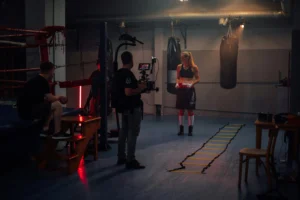How to practice Filmmaking?
An All-Inclusive Manual for Future Directors

Filming is a wonderful fusion of technical accuracy, visual art, sound design, and narrative technique. Whether your aim is to helm the next big-hit movie or just drive about producing engaging videos for YouTube, learning the trade requires constant filming. Filming might initially appear daunting; however, where should one start when there is so much to learn?
This blog will help you transform your enthusiasm into a useful skill set and coach you through how to practise filmmaking, even with minimal means.
1. Start with your present
Starting a film project does not need a costly camera or a degree from film school. Most modern cell phones have good cameras that would be more than suitable for capturing high-quality films. Your narrative tells more than just stuff; it speaks of importance.
One tip is to capture quick moments or vlogs on your phone.
More importantly than camera settings, concentrate on composition, lighting, and framing.
2. Study Film Language’s Foundations
Close-ups, wide-angle views, over-the-shoulder shots, tracking shots, etc., all have visual syntax unique to film. Every kind of shot advances a story point. Knowing this language facilitates greater audience communication.
Practice by dissecting the shots in sequences from your favourite films.
To see their impact, recreate these views using your camera or phone.
3. Methods of Study Editing
Your tale really comes together in editing. Editing regularly will help you grasp narrative cohesiveness, rhythm, and timing.
DaVinci Resolve: free, professional-grade recommended tool
- Express HitFilm
- CapCut (mobile)
Practice by staging a little scenario and editing it many times.
Play around with backdrop scores, colour grading, and transitions.
4. Short Story Script Development
One-minute short films also need a strategy. Composing scripts helps you to keep flow, create characters, and organise a plot.
Write one to two-page micro-scripts based on daily events.
Cut the scripts into little video segments.
Format using available free programs, such as WriterDuet or Celtx.
5. Participate in Film Challenges
Often, with time and thematic restrictions, film challenges encourage you to work under pressure. These are first-rate practice areas for honing your technical and creative abilities.
One such example is the 48 Hour Film Project and local student film events.
YouTube offers challenges such as “1-minute film with one location and no dialogue.”
6. Find Out About Sound Design
A film may be ruined or made with sound. A badly mixed audio track lowers the impact and diverts the viewers.
- Using your phone, record ambient noises for practice.
- Give your videos sound effects and voiceovers.
- Use sources like Freesound.org or YouTube Audio Library’s royalty-free audio.
7. Focus on Lighting
Lighting controls the tone of your movie. You may practice with lamps, natural light, or even a flashlight—not expensive lighting.
DIY Practice Ideas:
- Create striking shadows with one light source.
- Shoot the same scene many times a day.
- Make a softbox with tracing paper and a cardboard box.
8. Join Online Filmmaking Communities
Surrounding other artists speeds up your learning. Ask questions, share your work for comments, and team on little projects.
Suggested sites:
- r/filmmakers on Reddit
- Groups for Facebook filmmakers
- Discord servers for producers of content
9. Try to innovate by copying
Do not hesitate to imitate outstanding directors initially. Replacing yourself teaches you. Your own style will eventually show.
Try This:
- Choose a little moment from your favorite movie.
- Recreate it shot for shot with any tools at hand.
- Examine your performance in terms of both strengths and areas for development.
10. Shoot Every Day—even if it only lasts thirty seconds
What’s important is consistency. Even a thirty-second scenario makes you consider angles, illumination, and sound.
- Practice Prompts: Narrate without using words.
- Record a pet’s or a sibling’s “a day in the life”.
- Create a ten-second tension scenario with only camera motion and music.
11. Make Mistakes and Accept Criticism
Every director begins his or her journey somewhere. It’s OK if your initial videos aren’t very good. Every error gives you fresh insight. Share your work, solicit comments, and keep iterating.
Keep a filmmaking notebook in which you record every successful or unsuccessful event throughout every production.
12. Work with others
Filming is a team activity. Working with editors, performers, sound designers, and writers will teach you creative flexibility, delegation, and communication.
Practise working on brief projects with friends or classmates.
Try directing, acting, and editing to grasp the process from several directions.
13. Record Your Development.
Establish a YouTube channel or digital portfolio. This lets people find your work and aids in tracking your own development.
- Upload cuts or short videos to YouTube or Vimeo.
- Describe briefly what you were working on in every one.
- Plan fresh objectives after reviewing your previous efforts every month.
Conclusion
Learning to make films is an adventurous lifetime. The great filmmakers never stop learning; neither should you. Use what you already have, passionately create, and keep honing your trade. From a novice with a phone to a confident storyteller prepared to enter the film industry, with time, consistency, and curiosity, you will develop.

FAQs
1. Does one have to attend film school in order to be a filmmaker?
Not at all. While film school may provide organised study and networking, many great directors are self-taught. Most importantly, there is regularity of practice and devotion.
2. How can one start filming without a budget in the quickest manner?
Write basic scripts using your smartphone, film in natural light, and edit using free tools like DaVinci Resolve or CapCut.
3. How may I make my film’s narrative stronger?
Learn screenwriting principles; study short tales; see movies closely; practise writing and shooting short screenplays.
4. For what duration should my practice films run?
Start with 30 seconds to two minutes of microfilms. Try lengthier forms as your confidence increases.
5. Where may I get free filmmaking tools?
You have options to investigate:
- Film Riot and Cinecom.net are among YouTube channels.
- Reddit (r/films, r/filmmakers)
- Free Celtic script templates from Celtx
- Sounds and music from YouTube Audio Library and freesound.org.